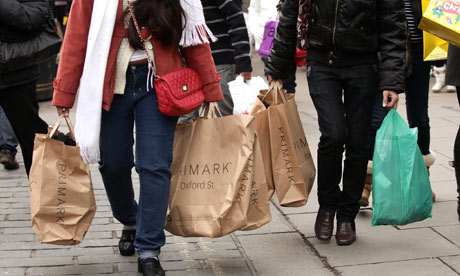Inflation fall driven by consumer squeeze
Retailers would love to pass on increased costs, but can't afford to raise prices – and the Bank can't risk a hike in interest rates

Shoppers hit by rising taxes and below-inflation pay rises are spending less on items such as furniture, clothing and entertainment. Photograph: Yui Mok/PA
You don't need to be a genius to work out what is happening to the UK economy. Indeed, this morning's inflation figures and the report on high street spending released overnight by the British Retail Consortium (BRC) tell you everything you need to know.
What's happening is that consumers are taking a fearful battering from rising taxes, lower public spending and pay rises that are running well below the current inflation rate. Far from using their homes as cash points as they were during the housing bubble in the middle of the last decade, they are now paying chunks off their mortgages whenever they can.
Put simply, many consumers are feeling a bit skint. The fact that it now costs upwards of £60 to fill up a car at the weekend means spending on books, furniture, clothing and footwear and entertainment is being squeezed.
Retailers have seen their costs rise over the past year. Higher commodity prices mean that they are paying more for the goods they buy from wholesalers and spiralling oil prices mean they are paying more for lighting and heating at their stores. They would dearly love to pass on these higher costs to their customers, and have been trying to do just that in recent months.
Now, though, retailers are seeing consumers vote with their feet and have reluctantly started to accept that prices – and hence profit margins – will have to be cut in order to keep business volumes up.
Last month, according to the BRC, the value of retail sales was 3.5% lower than a year earlier on a like-for-like basis, which takes account of the increase in floor space added by retailers over the past year. This was the weakest report since the BRC began putting out monthly releases in the mid-1990s, and was reflected in the fall in inflation from 4.4% to 4%.
This does not mean that inflationary pressure is now going to abate steadily month after month. Oil and commodity prices are still rising and will have an impact on the cost of living over the spring and summer. But it does suggest that fears of inflation hitting 5% may be a bit overdone.
As for the debate raging inside the Bank of England over interest rates, today's data provides powerful ammunition for the doves. The argument made by the members of the monetary policy committee who have been urging higher interest rates has been twofold: that the economy is strong enough to withstand the gradual removal of part of the stimulus provided by ultra-cheap money, and that without such action there will be a risk of higher inflation becoming embedded.
That narrative now looks highly dubious. It is clear from the BRC report that the domestic economy is extremely fragile despite a modest improvement in exports and, as things stand, could be pushed back into technical recession should the tightening of fiscal policy by the Treasury be accompanied by higher interest rates from the Bank. There are also few signs of a wage-price spiral developing.
In those circumstances, it is hard to imagine any of the six MPC members who have been voting to keep interest rates at 0.5% are going to change their minds in the immediate future. Those in the City who have been predicting that borrowing costs will rise next month will be proved wrong.

No comments:
Post a Comment